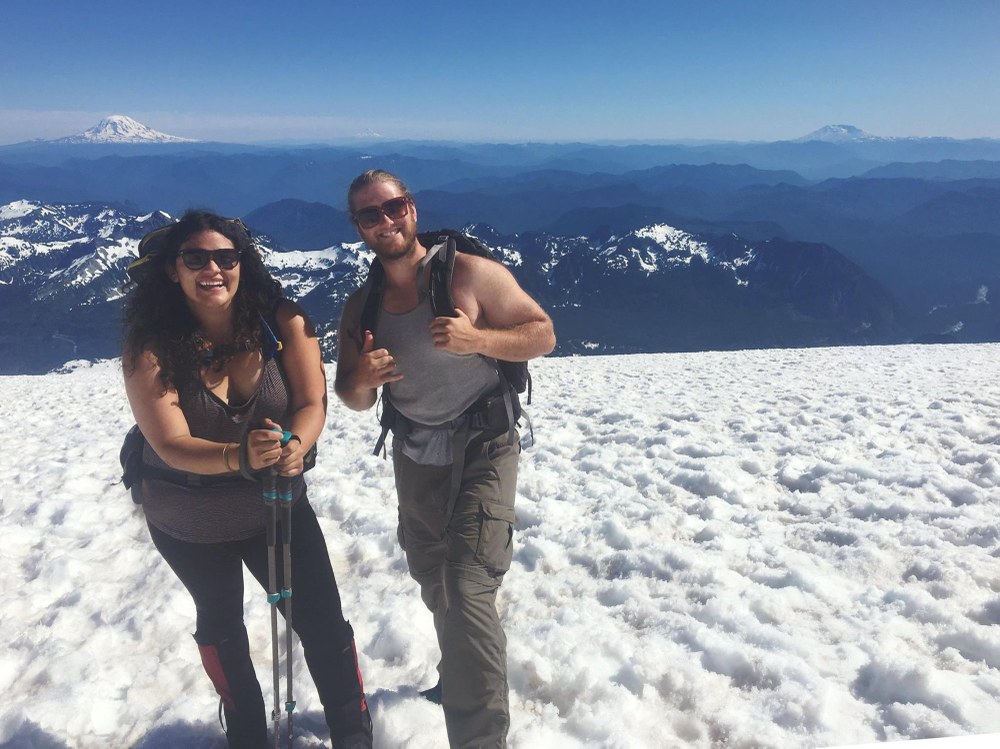
As The Mountaineers Membership & Communications Director, I spend a lot of time thinking about and interacting with the outdoor community. People are drawn to the outdoors by a sense of curiosity, but not everyone feels welcome in this space - either because of the actions of others or by the unwritten "rules" of who belongs in the outdoors. I'm here today to say: you belong here.
Imposter Syndrome
The feeling of being an imposter, or of not belonging, is often called Imposter Syndrome. According to the Harvard Business Review, "Imposter syndrome can be defined as a collection of feelings of inadequacy that persist despite evident success."
In the outdoors, and specifically within The Mountaineers, this shows up when someone feels like they shouldn't participate in an activity – say go for a hike – because they feel like they don't belong or don't deserve to be there. Yet, these same people still can and do go for hikes, but these feelings persist despite their accomplishments.
I am not an expert in imposter syndrome – I feel like an imposter writing this blog! – but I was compelled by a story shared in the PNW Outdoor Women Facebook Group to start a conversation on this topic. This group is not affiliated with The Mountaineers, yet many Mountaineers members are also members of this group, and vice versa.
A woman in the PNWOW group bravely shared a photo of herself at the end of the most difficult hike of her life. In the post, she touched on the struggle she went through along the way. She hiked more elevation than she ever had before, moving slow and getting passed by many, and felt an incredible sense of elation when she reached the top. Yet despite that success, she also talked about feeling like a fraud. Which inspired my question:
What makes you feel like you don't belong in the outdoors?
I asked the group, which has 30,000 members, "What makes you feel like you don't belong in the outdoors?" I was surprised by the number of responses and grateful for the feedback. While these responses aren't entirely representative of The Mountaineers community, the PNWOW group's experiences are similar to the feedback we hear from our participants.
As The Mountaineers embark on a journey to become a more welcoming and inclusive organization, it's important we keep the words of these women in mind.
why These Women feel like imposters
Women of the Pacific Northwest Outdoor Women's group cited feeling like imposters due to of age, experience levels, fitness, and not seeing themselves reflected within the existing outdoor community. Other issues include access to transportation, income disparities, lack of diversity, and lack of representation from the LGTBQ community.
Age

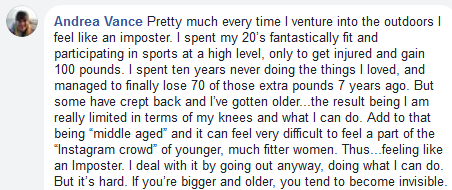
Size


lack of diverse faces
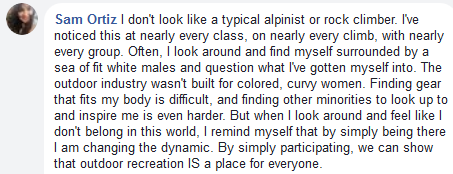
Comments/comparisons from others

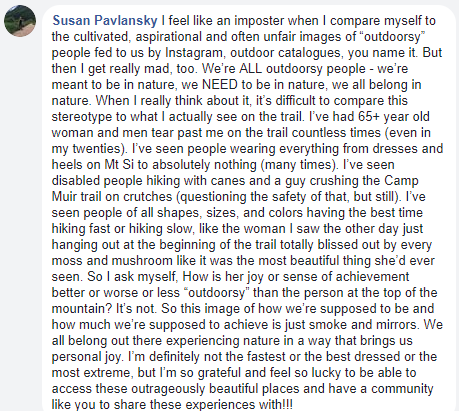
How these women are overcoming imposter syndrome
Overcoming these feelings takes grit and persistence, and it wont' happen over night. Women of the Pacific Northwest Outdoor Women's group offered a few helpful anecdotes to overcoming your own feelings of inadequacy:
you are just as worthy as anyone else

You can make your own mold


Only YOU get to decide where you belong
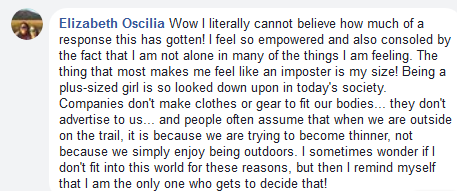
For more inspiration to help overcome imposter syndrome, check out this story by ultrarunner and author Mirna Valerio on the TransRockies Run: "This body is deemed a failure to many who judge it by its face value. It is devalued even, protested, and placed in the category of the unseemly. But take her out in the wild and she proves beyond a shadow of a doubt that instead of embodying burden, she is a powerful force."
And remember, don't let the comparison monster rob you of your joy.
Why this matters for Mountaineers
Becoming a more diverse, equitable, and inclusive community was cited as very important priority in last year’s Mountaineers town hall meetings and an online survey soliciting input for our new strategic plan, Vision 2022. Leaders across our organization are committed to this goal and we’re excited about the journey ahead, recognizing it will take time and require long-term focus.
We know through our member surveys that The Mountaineers have historically been viewed as "elitist" and "intimidating". Thankfully, that perception has waned significantly, but we still have work to do to create the type of community we outline in our Core Values - one which "provide opportunities for all: a diverse and inclusive outdoors inspires unity, respect, and passion for the places we love."
Have you felt like an imposter in The Mountaineers? Why? When you do feel like you belong, what has contributed to that feeling?
Blog image by Sam Ortiz.
Add a comment
Log in to add comments.Kristina, awesome, thought-provoking blog post! I saw your question posed on PNW Outdoor Women and am glad to see that you compiled the responses in such a thoughtful way. I'm 55-years old and love hiking, backpacking and scrambling, but didn't really get into it until about 5 years ago. I'm now trying to reach out to other women who have expressed an interest in getting into hiking, but are fearful. Working on a series of beginner hikes to help women break into our incredible outdoor world "where nature may heal and cheer and give strength to the body and soul alike" (to steal a quote from Mr. Muir).
Thanks so much for reading and for your comment Barbara. I think this is an important topic, and I'm grateful to you for doing what you are doing to make the outdoors more accessible for all!
This is awesome! Thank you for raising this issue. I'm a fit white male who knows what it's like to feel like an imposter in some situations, but not the outdoors.
Thanks Mike for your comment! I think we can all related to feeling like imposters in certain situations, and it's important for us to remember that not everyone feels safe where we do.
Kristina this is my favorite blog post yet! I did not know this was a thing until a friend told me he was struggling with it. I love the 2022 vision and hope more members feel welcomed by all of us.
Thanks so much Skye! A comment like that of your friend prompted this piece, and I am grateful to be part of The Mountaineers' efforts to be more inclusive.
Thank you so much for this blog post. I also saw the post in the PNWOW group. And I haven't stopped thinking about it. Thank you for keeping this topic alive! One of the things I love most about the Mountaineers is interacting and adventuring with so many diverse folks. I hope the Mountaineers will continue to work on being inclusive.
A related article...
https://www.backpacker.com/stories/the-venture-out-project
Thanks Cheryl! I love interacting with such a variety of people too, and I'm proud to work for an organization which is putting inclusion efforts at the forefront of everything we do! Thanks for sharing the article as well - I'll check it out!
Thank you, Kristina, for raising this important and thought-provoking issue. I think many males suffer from the same feelings, but are less likely to talk about it or admit it due to our macho-competitive male culture. When I used to instruct in the scrambling and climbing courses, some of my greatest satisfaction came from seeing students - men and women - gain confidence and competence as they progressed through the courses. Often, the change was dramatic. More than one person who started the scramble course being tentative and afraid of heights went on to become a capable and respected climb leader and lead very demanding and technical climbs.
What a great experience! Thanks for sharing Dale!
It is comforting to know that there are so many others in my shoes. I joined mountaineers in November 2017 because I needed to get out in nature more. It’s tough being middle aged and out of shape, hiking with people that can do the trail in a forth of the time it takes me. As embarrassing as it feels to be one of the last, I still feel very accomplished when I get to the top! I can only get better by doing it. While I do go out on my own, Mountaineers helps me leave my comfort zone, and push myself to reach for more.
Congratulations to you Rhonda! Keep on pushing, and find comfort in being where you are. Never be embarrassed, and know we all feel this way sometimes!
 Kristina Ciari Tursi
Kristina Ciari Tursi